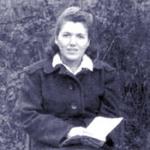 Paula Nardai was born on April 12, 1923, in Rumpersdorf, district of Oberwart, Burgenland) [Burgenland-Roma], where she lived with her parents, her sister Emmi (born in 1927), and her brothers Karl and Josef (born in 1935), until her deportation to Auschwitz-Birkenau in 1943.
Paula Nardai was born on April 12, 1923, in Rumpersdorf, district of Oberwart, Burgenland) [Burgenland-Roma], where she lived with her parents, her sister Emmi (born in 1927), and her brothers Karl and Josef (born in 1935), until her deportation to Auschwitz-Birkenau in 1943.
According to Paula’s records, there were at the time two Gypsy settlements in Rumpersdorf, which were situated at the outskirts of town. Her parents worked in the village itself; her grandfather had been a blacksmith. In contrast to her sister, who had to leave school when the Nazis seized power, and her younger brother, who never even started school, Paula attended primary school until 1938 and then worked as an agricultural helper first in Rumpersdorf, and after 1938 on the neighbouring village of Hodis.
That same year, the first of her relatives were deported and interned: both of her uncles were taken to the concentration camp of Dachau, while her aunt was taken to Ravensbrück. ["Racial-biological evaluation" of the Gypsies / First Deportations and Internments in Internment Camps] Between 1940 and 1943, Paula worked at the feudal estate of the Countess Batthyáni in Rechnitz.
On April 15, 1943, shortly after her 20th birthday, her family was first taken to Weiden by the police and then by truck on to Rechnitz. From there, the Nardais and other "gypsies" from surrounding villages (Podgoria, Althodis and Zuberbach) were transported to Auschwitz in cattle wagons. Paula’s brother Karl was the only one to escape deportation. He survived the time of National Socialism undiscovered in Germany.
Paula, who received the concentration camp number Z-7342, and her family were part of a transport which was recorded in the illegal calendar of Auschwitz inmates as follows: April 16th, 1943: transport of prisoners from Austria: 1874 gypsies. 938 women and girls received the numbers Z-671 to Z-7728.
In the camp, Paula was forced to work like all the others. As part of the so-called external work force, she had to gather stones for road construction. By 1945, Paula had lost all her relatives: first, her mother got sick and never returned from the camp hospital. Then she lost her father, who died from mistreatment. Her eight year-old brother was taken away from the barracks while Paula was at work. In 1944, the camp inmates were moved to Ravensbrück. Only the young and healthy were chosen for transport. The others, among them Paula’s sister Emmi, stayed behind and were gassed. From Ravensbrück, Paula was later taken to Taucha. Finally, during the last days of the war, she was moved to Hamburg.
Following her liberation on May 5th of 1945, Paula returned to her hometown. Since the family’s house had-surely under questionable conditions-- been taken over by a stranger, who was now living in it, she went on to do agricultural work in Sigless. There she got to know her future husband Josef, a Rom from Oberwart.
In 1952, their son Josef was born. At that time, the family was still living in the so-called "Zigeunerbaracke" ("gypsy barracks") on the outskirts of Oberwart. When Paula’s husband received compensation for his internment, he had a house built. Their second son, Helmut, was born in 1955. In 1972, the family moved to the terraced houses "Am Anger" that had been newly constructed by the city.
Josef Nardai, who had been imprisoned in Mauthausen during the time of national socialism, died in 1978. Paula’s brother Karl stayed in Germany after the war. Sister and brother stayed in touch through writing, yet never saw each other again.
Up until she died, Paula Nardai was one of the most important and respected personalities of the Roma settlement in Oberwart. Contrary to other survivors of the Holocaust who were unable to speak about their traumatic experiences in the concentration camps even among their closest relatives, Paula often talked about her own family’s fate. In the firm conviction that the cruelties and horrors of national socialism must not be kept secret, she volunteered as a historical witness at schools throughout Burgenland. Paula Nardai was one of the first to allow for her life to be recorded and published. This deserves special praise, considering the fact that due to their personal experiences and/or present fears, most Roma of the older generation have completely withdrawn and avoid anything relating to public life.
Paula moreover has made great contributions to the conservation of Roma culture by passing on traditional tales and songs. Throughout the decades, the Nardais’ home was an important meeting place, especially for children. Some of the tales told to them by Paula were recorded by the Romani-Projekt of the Institute of Linguistics at the Karl-Franzens-University of Graz and made accessible to the public in form of a compilation of stories called "O rom taj o beng / The Rom and the Devil".
Thanks to the founding of the Roma Organisation in Oberwart at the end of the 1980's, important accents were set in socio-political and cultural respects. Paula was one of the very few members of the generation of Holocaust victims who welcomed and supported the process of a cultural opening. Her performance in the film "Amen sam so amen sam," produced by Hans Panner in 1993, which deals with the "presence of the past" in Roma life, is memorable.
Similarly, Paula’s cooperation in the language project called "The Codification and Didactisation of Romani" was of great value, especially considering the fact that at its start in 1993 there were only a few Romani speakers who had retained full language competence.
Paula Nardai, who thanks to her human greatness was highly respected by everybody- especially however by the children, for whom she represented the ideal grandmother- died in May 1999.